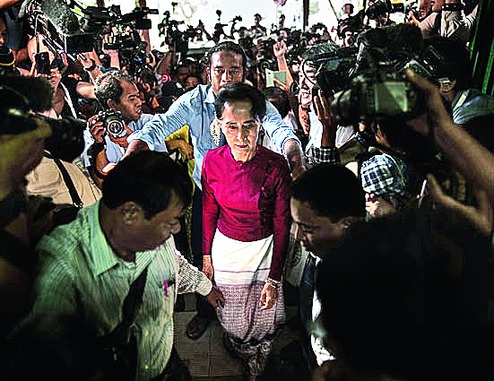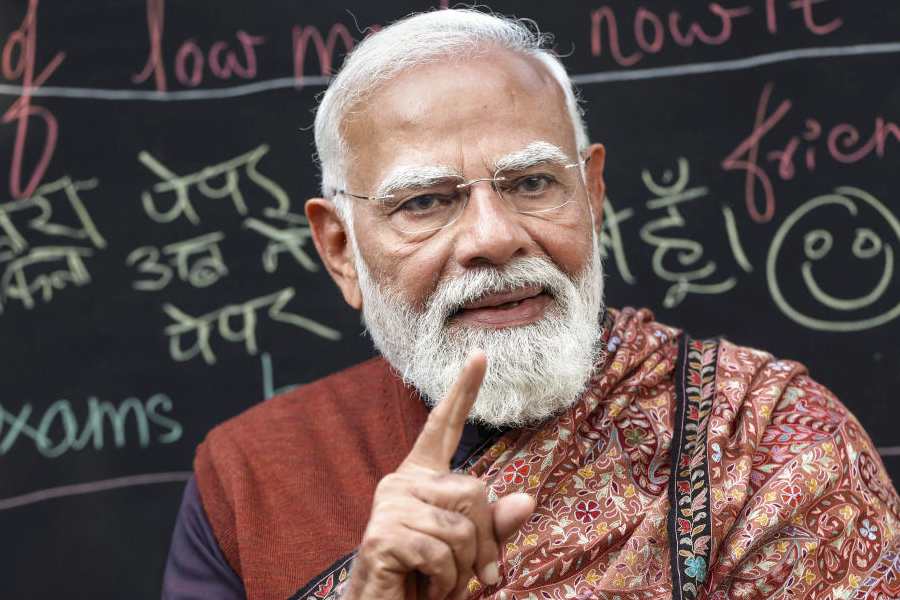
The National League for Democracy government in Myanmar under the state counsellor, Aung San Suu Kyi, has completed one year in office, accompanied by a tide of foreign criticism of its leadership. After almost six decades of military dictatorship, civil war, economic mismanagement and the absence of institutional infrastructure, it was unreasonable to suppose that the NLD could turn things around quickly, although Suu Kyi's undeniable charisma prompted unrealistic expectations. She had no magic wand to change the basic political structures in Myanmar in a span of 365 days, and has acknowledged publicly her supporters' frustration with the slow pace of reforms and development.
Political transitions usually tend to be painful. Mikhail Gorbachev's reform process led to the disintegration of the Soviet Union, while Yugoslavia plunged into civil war causing untold misery, especially to the Bosnians. The widespread negative consequences of the failed Arab Spring are self-evident. In relative terms, Myanmar has been a success story when it passed through two election cycles and witnessed a peaceful transfer of power. While there have been failings, there is also progress made; important political constituencies such as the military, opposition forces, ethnic parties and some major armed ethnic organizations are still in dialogue within the political process.
The gross domestic product growth had been in decline since 2014, with main export destinations, especially China, experiencing economic setbacks. Yet Myanmar registered 6.4 per cent GDP growth in 2016 compared to 7.3 per cent in 2015, and there is now greater investment in infrastructure and better healthcare. The NLD confronts numerous economic challenges such as the lack of transparency in extractive industries and State-owned enterprises, but according to the Asian Development Bank, Myanmar is expected to grow at 7.7 and 8 per cent over the next two years. A 12-point economic policy was announced last year, but given substantial institutional weaknesses, economic reform will convey a mixed picture for the foreseeable future.
The biggest challenge for Suu Kyi, however, is in the political realm, where her reaction to the ethno-religious crisis in Rahkine state has drawn sharp criticism from the West. The Muslim-Buddhist conflict involving the minority one-million Muslim Rohingya community has a very long history, and came to a head last October after a militant uprising that killed nine policemen. This led to severe reprisals by the army on the Rohingyas with reports of rape, killings and blocking of aid. The government and the Burmese majority claim there is no Rohingya Myanmar community, only illegal immigrants from Bangladesh, whereas the Rohingyas believe they constitute a distinct Burmese ethnic group. This conflict has resulted in large-scale violations of human rights, internal displacement of tens of thousands into refugee camps and emigration of hundreds of thousands of others. International agencies deploy words like 'ethnic cleansing' and 'genocide' to describe the situation, and some Southeast Asian nations are unhappy with the flow of unwanted migrants to Malaysia, Indonesia and Thailand. Suu Kyi has denied there is ethnic cleansing and that Rohingyas returning from abroad will be welcome. She added that "military matters are to be left to the army". More than a dozen Nobel laureates in an open letter stated: "Despite repeated appeals to Daw Aung San Suu Kyi we are frustrated that she has not taken any initiative to ensure full and equal citizenship rights of the Rohingyas." The growing violence, the West's switch from adulation to condemnation, and criticism from fellow Nobel laureates cause Suu Kyi considerable distress.
Suu Kyi sought to address the growing violence by constituting an advisory commission on Rakhine state headed by the former United Nations secretary general, Kofi Annan, and comprising six local and three international experts, to propose measures to foster communal harmony. However, such recommendations would come in only later this year. In her briefing on sectarian violence to foreign ministers of the Association of Southeast Asian Nations last December, Suu Kyi sought "time and space for the government's efforts to bear fruit", but there is a general perception that she is trying to manage international opinion without any clear initiatives on the Rakhine unrest. The UN human rights council, on the basis of a damning report of interviews with 200 Rohingya refugees in Bangladesh, has decided, against the votes of India and China, to send a fact-finding mission, while Suu Kyi's spokesperson claimed the allegations were exaggerated and the issue was internal and not international.
Suu Kyi faces a three-dimensional challenge: first, she is not in control of the security forces. The Myanmar military is independent of civilian authority and can exert influence on other institutions; second, some of the vital ministries such as home, defence and border affairs are controlled by the military; third, there is fervent majority public opinion, supported by sections of the Buddhist clergy, against giving citizenship to Rohingyas.
Suu Kyi is therefore administratively and politically in a delicate position to address the Rakhine ethno-sectarian violence. If she articulates her concerns with greater vigour, she will lose the support of large sections of her main popular constituency. Given that the military controls 25 per cent of Parliament, there could also be attempts to unsettle the existing regime, and Suu Kyi's exit from government will doubtless precipitate huge instability and greater violence against religious minorities. As a consequence of the Rakhine crisis, the attention of Suu Kyi's critics is drawn away from other fault lines in Myanmar's polity, such as the military's presence in the legislatures and decision-making, demands for federalism and the steps required to protect the rights of diverse ethnic languages and cultures.
On national reconciliation between various ethnic groups, there has been partial progress. The earlier President Thein Sein government concluded an agreement on a draft national ceasefire agreement, and in an effort to generate consensus the NLD called a national conference in August last year. A reasonable number of ethnic groups participated, but others expressed reservations about the dialogue process and some of the main armed groups such as the Kachin Independence Army and the National Democratic Alliance Army did not sign the ceasefire. Hostilities between these groups and the military have caused civilian casualties, movement of people across the border into China and internal displacement of some 160,000 persons. These developments cause deep resentment among some ethnic groups.
In 19 recent by-elections, ethnic parties improved their performance, but the NLD won nine of them. Critics may claim there is a decline in NLD's popularity, but it should be noted that Suu Kyi did not campaign, some of the seats were located deep inside areas under the sway of armed ethnic groups, and voters were aware that these elections have no bearing on the composition of the national Parliament. As yet, disillusion with Suu Kyi in the Western media seems to have no correlation with the voters' declared preference.
There has been some forced migration into India because of the conflict in Rakhine. In spite of the growing Western concern, it should be noted that the Myanmar military has a long track record of withstanding international pressure, and it can always rely on Chinese support. There is still a significant community of Indians living in different parts of Myanmar, and this adds to legitimate hesitation in New Delhi about involvement in emotive domestic issues in a neighbouring country. Nonetheless, India could explore avenues such as military-to-military dialogue on counter-insurgency operations which could be expanded to discussion on responding to humanitarian issues. On questions of federalism , India has both legislative history and experience in resolving demands for greater autonomy. Both countries should create an institutional framework to share some of these knowledge platforms.
S. Pulipaka is a senior consultant with ICRIER, New Delhi. K. Srinivasan is a former foreign secretary










